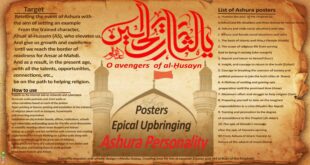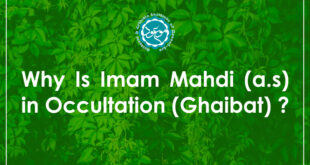The Marriage of Imam Ali.
Imam Ali’s marriage with Hazrat Fatima, the daughter of the Holy Prophet (S.A.W.), took place in the 2nd year after Hijra. Whereas the Holy Prophet (S.A.W.) had refused many proposals for her from prominent and wealthy companions, he was delighted when Ali approached him asking for his daughter’s hand, and said that it was a welcome and happy proposal. The Holy Prophet (S.A.W.) also later informed the Muslims that since he had no male heir, Allah (SWT) decreed that his progeny would issue forth from the union of his daughter Fatima with Ali.
On the occasion of their marriage, the Holy Prophet (S.A.W.) prayed to Allah (SWT) with these words: “O Allah! Bless both of them, sanctify their progeny, and grant them the keys of Thy beneficence, the treasures of Thy wisdom and Thy genius, and let both of them be a source of peace and blessing to my people.”
Addressing Imam Ali, the Holy Prophet (S.A.W.) said, “Fortunate are you indeed! Of all the virtuous women of the world, your wife is the queen!” Then turning towards Fatima, he said, “Of all the virtuous men of the world, your husband is the king.” To both of them he said, “May Allah keep you pious and chaste and bless your children. Verily, I am a friend to him who befriends you, and an enemy to him who is your enemy.”
Ali as Caliph and ruler:
After the death of the third Caliph, Ali (A.S.) was literally forced to accept the position of the Caliph. He did so reluctantly on the condition that he would rule strictly by the true Sunnah of the Prophet (S.A.W.) and by the ordinances contained in the Qur’an. He immediately removed the corrupt regional governors of the Islamic empire, and demanded honesty, integrity, accountability, and compassion from the government officials. He himself adopted an extremely austere lifestyle.
When he appointed Malik-ul-Ashtar as governor of Egypt, he issued orders to him as to how he should deal with various personalities, the poor subjects, and how to handle various situations. He emphasized on fearing God, and honesty, justice, and humility.
The famous Arab Christian scholar, jurist, and philosopher Abdul Maseeh Anthaki says that this order of Imam Ali established a far superior code of administration than the one handed down by Prophet Moses. He congratulated Ali for establishing those principles.
Please refer to Nahjul Balagha, Letter No. 53 (An Order to Malik-ul-Ashtar).
His letter to Osman Ibne Haneef, the Governer of Basra, gives us an indication of Imam Ali’s philosophy and his administration. Here are a few excerpts from that famous letter:
“Ibne Haneef! I have received information that a person of Basra invited you to a dinner and you immediately accepted the invitation. And very sumptuous meals were served there. I am sorry to hear the news. I never expected that you would accept invitation from a person who invites big officers and rich people and from whose door the poor and hungry are turned away rudely. Look carefully into the things you eat. If there is even a shade of their being obtained unlawfully, then throw them away. Only eat such things about which you are perfectly certain that they are obtained in honest, lawful, and virtuous ways.”
“Now look at your Imam and leader. In this world he has satisfied himself and is content with two old, coarse, and worn out garments to wear, and two pieces of bread a day. It is not possible for me to satiate myself when there are people around me whom hunger and thirst keep restless and writhing.”
“O’ Ibne Haneef! Fear Allah and be content with the bread that you get with lawful means, so that you may be exempted and freed from the fire of hell.”
Please refer to Nahjul Balagha, Letter No. 45.
His martyrdom:
During his brief rule of about 6 years, Hazrath Ali had to deal with corruption, rebellion by his Governors and officials, and treachery by his own followers. He fought several wars to defend his principles and to maintain the integrity of the Muslim Empire. He died a martyr at the age of 63 on the 21st of the month of Ramadan, 40 A.H., after being mortally wounded by a Kharijite while he was praying in the mosque at Kufa. His words when he was struck with the sword were: “I thank thee O’ Lord for rewarding me with martyrdom. How kind and Gracious of Thee. May Thy Mercies further me to the Glory of Thy realm.”
His knowledge:
Prophet Muhammad (S.A.W.) said this about Imam Ali (A.S.): “I am the City of Knowledge, and Ali is the gate.” He also said: “Verily the Holy Qur’an is revealed on seven letters (levels) of which there is no letter which has not a manifest (exoteric)and a latent (esoteric) meaning, and verily Ali Ibne Abi Talib, with him is the (knowledge of) manifest and the latent (of it.)” Sahih al-Bukhari & Suyuti’s Itqaan. The above two Hadiths speak volumes about Ali’s knowledge.
His vast field of knowledge included biology, medicine, astronomy, the origin of universe (please refer to his famous sermon number one in Nahjul Balagha), philosophy, Islamic jurisprudence, mathematics, rhetoric, and more. He made major contributions to developing the grammar of the Arabic language.
Nahjul Balagha:
The title of this book means “Peak of Eloquence.” It was compiled by Syed Razi and contains sermons, letters and sayings of Imam Ali. It is said that its subject matter is next only to the Qur’an in eloquence, guidance, and knowledge. It is a book that is not only beneficial to Muslims but to all mankind. His code of administration as documented in Nahjul Balagha was quoted in the United Nations by the U.N. Secretary General in the year 2002 during a meeting of the Arab Development Fund. He advised the rulers and government officials to follow the principles contained therein as a role model of governance.
By: Syed Hasan Akhtar Austin, Texas
 Mouood Mouood English Edition
Mouood Mouood English Edition




